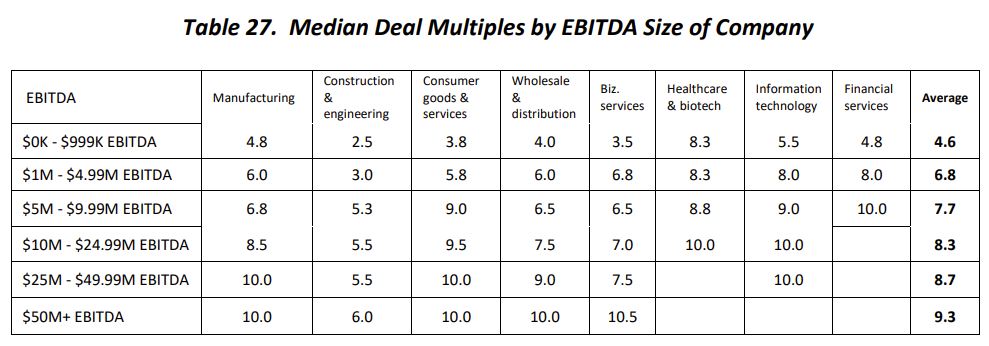One of the key factors to consider when evaluating the value of a business is it’s size.
The EBITDA (Earnings Before Interest, Taxes, Depreciation, and Amortization) multiple is a widely used valuation metric that helps determine the worth of a business.
In this article, we will explore how the size of a business can impact the EBITDA multiple used when valuing a business.
The Relationship Between Business Size and EBITDA Multiples
Larger deals generally command higher multiples. This is because larger businesses tend to have more stable earnings, better-established market positions, and greater access to resources.
As a result, investors are often willing to pay a premium for these companies.
Median Deal Multiples by EBITDA Size
To better understand the relationship between business size and EBITDA multiples, we can look at median deal multiples across different EBITDA ranges. For example, the 2023 Private Capital Markets Report published by Pepperdine shows businesses with higher EBITDA tend to have higher multiples across various industries.

Inconsistent Profitability and Business Size
One factor that can negatively impact a company’s EBITDA multiple is inconsistent profitability. If a business has earnings that are highly volatile, investors may be less willing to pay a high multiple for those earnings. This is especially true for smaller businesses or those that are relatively new in their respective industries.
Repositioning a Business for Higher Multiples
One strategy for increasing a company’s EBITDA multiple is to reposition the business into a higher multiple industry. This can involve adding or divesting business units to make the company more valuable. By doing so, entrepreneurs can create more value for their businesses without necessarily changing much about their core operations.
Conclusion
In conclusion, the size of a business plays a significant role in determining the EBITDA multiple used when valuing a company.
Larger businesses tend to command higher multiples due to their stability and market position.
Entrepreneurs should be aware of this relationship and consider strategies to increase their company’s value, such as repositioning their business into a higher multiple industry or improving profitability consistency.
By understanding these factors, business owners can work towards maximizing their company’s worth and potential exit value.









